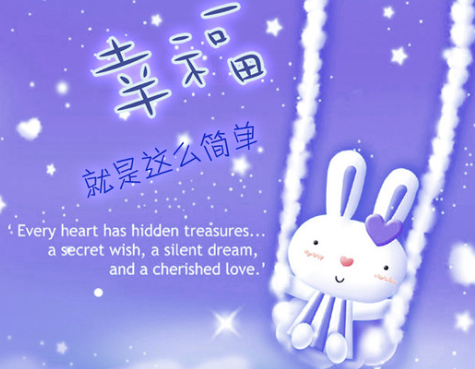(单词翻译:单击)

What is the definition of "happiness"? Is it material wealth filled with fancy cars, a dream house, extravagant furs and jewelry? Or is happiness simply having a roof over your head? Food in the fridge? Having a child? A pet? A swimming pool? A designer Gucci bag? Parents? Grandchildren? Love? Money? The perfect job? Winning the Lottery?
“幸福”是什么?幸福是拥有豪华的汽车、梦想的居室、名贵的裘皮和珠宝等物质上的富足嘛?或者,幸福其实很简单——有遮风避雨的住所,冰箱里有食物,有孩子、宠物、游泳池、Gucci的包,有父母、子孙、有爱情、金钱和理想的工作,彩票中奖了呢?
According to the American Heritage Dictionary,"happiness"is derived from the Middle English word hap—meaning" Luck." But does happiness really have anything to do with" luck"? We could assume that if you avoided a fatal traffic accident but got fired by coming late to work, would you be filled with "happiness?"? Is it luck or what do you make of it? Maybe,"happiness"is exactly defined by its indirect alias: happiness—perhaps, happiness is in fact defined by the fortune that we permit to happen.
在《美国传统字典》中,幸福是从中古英语“Hap”一词演变而来,“Hap”意为“好运"。幸福真的与“好运"有关联吗?基于此,想想看,如果你在一场必死无疑的交通事故中幸免于难,却因此迟到,导致被老板炒鱿鱼。对此,我们应该感到“幸福”吗?这是好运吗?还是要看个人如何看待这个问题呢?或许确切地说,幸福的定义应当直接从它的词源来看——事实上,幸福或许就是命中注定要发生的事情。
Do you recall a time—let's say when you were about 5 years old—what defined happiness back then? Was it getting a puppy for Christmas? Or maybe, you were a child of divorce; and all you wanted was for Mom and Dad to get back together again? Then as you got older, you were hoping that someone would ask you to the prom that would've made your day, maybe your life for the moment. During college, good grades made you happy, but it was short"lived. Because in the real world, you had to look for a job, and competition was stark. It's an employer's world you thought. But then, you got the perfect job now you could be happy or could you?
你能回忆起你5岁时对幸福的理解吗?那时,幸福是从圣诞树上摘下的一只小狗吗?或者爸爸妈妈离婚了,你唯一的愿望就是他们能和好如初,重新生活在一起?当你渐渐长大,你希望有人会邀请你参加舞会,希望所有的日子都凝固在那一天,那一刻。上大学期间,考试得了高分让你无比开心,但这种幸福感毕竟是短暂的。因为在现实中,你得找一份工作,而社会竞争也相当激烈。于是,你就会想,这是一个雇主的世界。随后,你找到了一份理想的工作——现在的你很开心,是吗?
Life requires more than just what we want. Inevitably, one must understand that to truly find" happiness", he must make his own happiness "happen". Sounds a bit redundant, but truthfully, there is no set guidelines that will bring one happiness. There is no "magic wand" we can wave to bring joy into our lives. Human nature thrives on the thrill of the chase. We dream and we hope for the next big Brea—it is the grand adventure of living.
生活向我们索要的远比我们想要的多。一个人必须明白,要想真正找到幸福,他就必须让自己幸福。可能听起来有些多余,但确是如此——生活中,没有能代来幸福的现成的指南,也没有挥一挥就能带来欢乐的魔棒。人性在追求幸福的刺激中不断升级、完善。我们梦想着,期望着下一个大的转变—这就是生活中的大冒险了。
We are hopeless creatures of comfort. We like having and accumulating things. Whether one admits to it or not, to a certain degree, we all try to keep up with" the Jones". We work so we can pay our rents, mortgages, credit card debts, school loans, car payments...the list goes on and on. And at some point, we realize, that aside from having most of what we want, we still aren't happy. Now since we've learned to adapt to new standards which we've created for ourselves, we find that we have less time, less patience, less sleep, which equates to more stress, more worry and more aggravation. So, is happiness honestly just comprised of" things"?
我们是无助的享乐者,喜欢拥有和积攒东西。不论人们承认与否,一定程度上,我们都在相互攀比。我们之所以工作,是因为要付房租,偿还抵押贷款,还清信用卡透支费用,偿付助学贷款,买车,等等。此类费用接连而至,让我们应接不暇。于是,我们会突然意识到,尽管拥有了想要的一切,我们仍然不幸福。自从适应了自己定下的新生活标准,我们的时间短了,耐性没了,睡眠少了,但压力大了,焦虑多了,脾气也暴躁了。鉴于此,幸福真的是由“物质”组成的吗?
Sometimes, we virtually pay our lives for not only basic necessities, but for excessive items and services as well. We become so obsessed with finding happiness, that we lose sight of the fact that happiness is within—always. Certainly you've heard of individuals trying to "find themselves", or "rediscover themselves". The reason they are attempting these innovative approaches is because they are seeking inner happiness. But the point has been missed: Happiness is already there.
事实上,有时,我们不仅用生命交换生活必需品,还用生命交换多余的物质享受和服务。我们这般沉迷于追求幸福,却忽略了一个事实——幸福一直就在我们心中。当然,你一定听过这样的事,即有些人一直都在苦苦“找寻自我”或“重新发现自我”。他们创新尝试的理由只不过是想找寻心灵深处的幸福。但他们忽略了一点,即幸福从头至尾到在心中。
Disappointments and tragedies in life will come and go, but happiness never leaves you. The human's capacity to be resilient to redials is unfathomable. We can lose our jobs, but be grateful for our spouses. We can lose our homes to nature, but be thankful to alive.
失望和悲伤在生命中交替轮回,但幸福从不会舍你而去。人类对困难的适应能力无可限量。我们可以失去工作,但会为拥有爱人而感恩不已;我们可以流离失所,但会为活着而心存感激。
Happiness is a perception of each individual. We are instinctively compelled to find fault in our lives. By human nature, we begin our "fault"find"ing" mission the moment we're capable of free"thinking. It is then, that we lose sense of self"worth and the bigger picture of vitality altogether. Stuck in the patterns of the happiness paradox, we simply cannot find where our happiness has gone.
幸福是个人的一种感知。我们本能地受限于外界,找寻着生活的瑕疵,出于人的天性,我们从有能力自由思考的那刻起,就开始对生活吹毛求疵。也就在那时,我们失去了对自我价值的认知,也失去了生命的活力,陷于幸福的矛盾中,找不到幸福的方向。
It's not a matter of bargaining, it's not an issue of money or fame—instead, happiness is what you resolve to accept. If we live through optimis"tic hope; if we dare to dream; if we empower ourselves to fully live; then we have regained our sense of happiness, There is no in between. There is no other replacement. We only have one physical life to live—we have no choice but to make the most of it.
幸福是你决定去接受的东西,没有任何商量的余地,它于金钱或名誉毫无瓜葛。只要我们活在乐观希望之中,敢于大胆梦想,活得简单纯粹,那么,我们就会重新拥有幸福的感觉。那种感觉并非悬于幸于不幸之间的真空地带,也无任何替代品。我们只能活一次——除了好好活着,我们别无选择。


